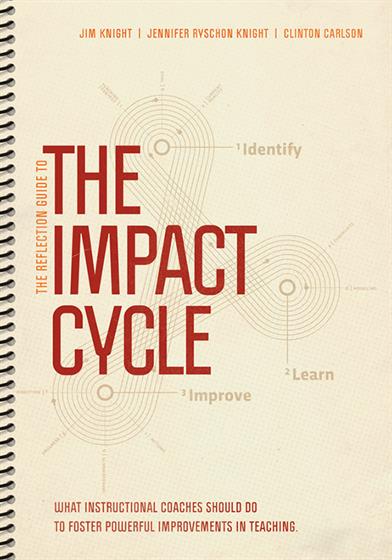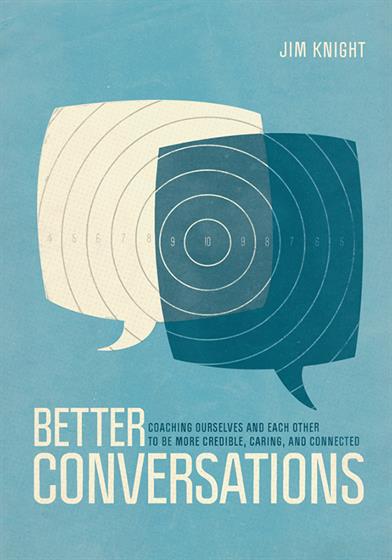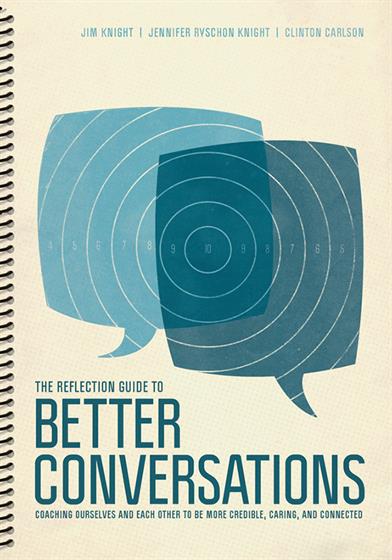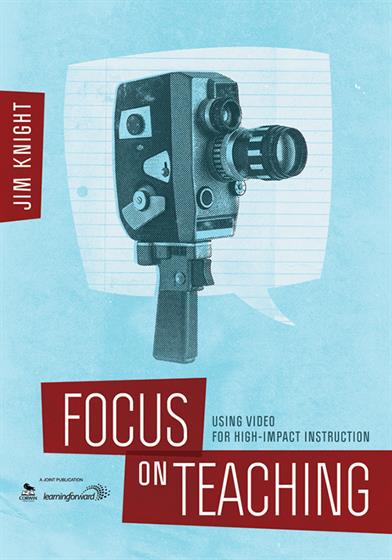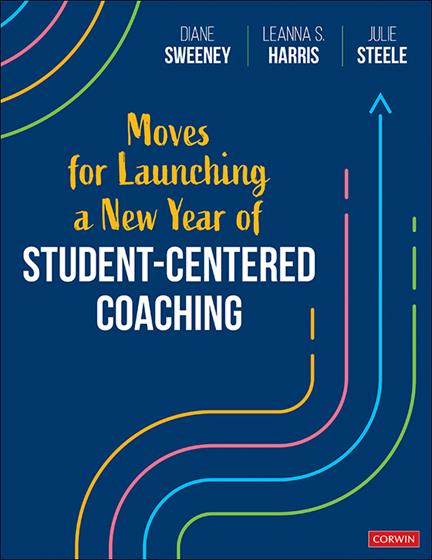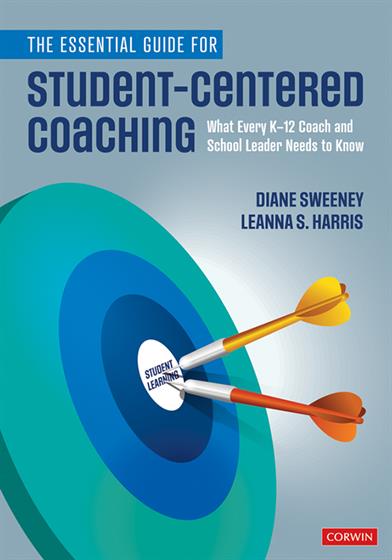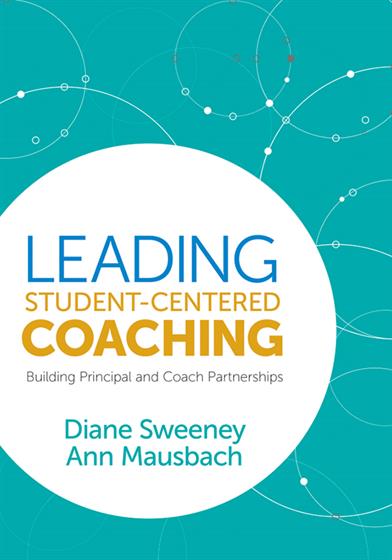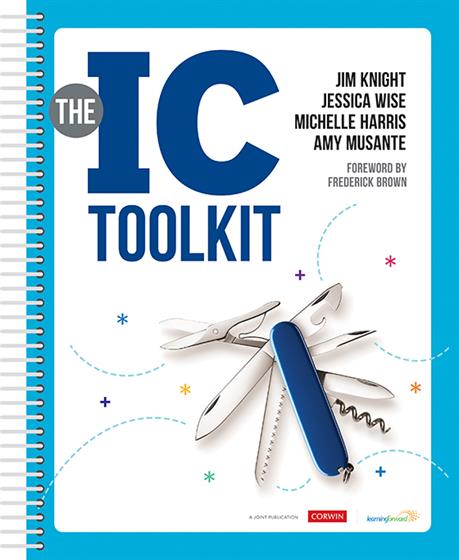ANNOUNCER: Welcome to Corwin's Leaders Coaching Leaders podcast with hosts Peter Dewitt and Michael Nelson. This
podcast is from education leaders for education leaders. Every week, Peter, Mike and our guests get together to
share ideas, put research into practice, and ensure that every student is learning not by chance but by design.
PETER DEWITT: Michael Nelson, here we are.
MICHAEL
NELSON:
Another episode.
PETER DEWITT: Another episode of Leaders Coaching Leaders.
MICHAEL
NELSON:
Yeah. I'm excited. This guest, wow. We have Jim Knight with us, Peter.
PETER DEWITT: We do. Yeah. Jim Knight-- I've known Jim for many years, actually. When I left my role as principal, I was starting
to work with John Hattie, and then Jim, I worked with Jim for a year on instructional coaching, so yeah. Yeah.
MICHAEL
NELSON:
I think those in the education world, do you know John Hattie? And then what's another name that you might
know? I think Jim Knight might pop up as somebody they know, maybe somebody they have read or connected
with. That says something. He's done a lot in his career.
PETER DEWITT: Yeah. It's definitely synonymous with instructional coaching. He's been doing research on instructional coaching
for many years. So Jim started the instructional coaching group, and he has been doing research around
instructional coaching for well over 25 years. And you're right. When you hear instructional coaching, you think
Jim Knight. So we get to interview him and talk to him a bit about his research.
But also he just had an icy toolkit that came out in October and quickly went to bestseller. He actually talks about
how it went to bestseller in two weeks, and he has quite the following. I mean, he really does. And it's expanding
around the world. So what do you want people to think about when they're listening to this interview?
MICHAEL
NELSON:
Gosh. You know that toolkit book is pretty remarkable, and he divides things into seven different factors. But
seven is a lot. You and I have talked about how does your mind remember that. And it really clustered the seven
into three groups if you really listen to him. The first three, he clusters together. And then the second three-- and
then the last one really builds in the system approach. And I like the way in which he clustered them. Because for
me, I can hold on to that information as I think through his work.
And he uses the word listening quite a bit, and maybe we'll talk about that a little bit more at the outro after our
listeners have had a chance to hear from Jim. But he uses the word listen in lots of different contexts and
analogies. And really, that is the key to coaching and helping the person that you're coaching transfer and make
a difference for students.
PETER DEWITT: Yeah. And one of the things I want people to listen for is when we ask him about what he's learned about his own
research over the last few decades that he's been doing this work, he really talked about the learning trajectory
he went on since 2006. And I really want people to hear that because so often our listeners, like school leaders or
instructional coaches, think they're supposed to know it all. And what they have to realize is that they're growing
at the same time that they're doing this work. Just like when you and I are writing books, we're growing at the
same time. So I'm very excited for people to listen to our podcast interview with Jim Knight.
ANNOUNCER: Say goodbye to slow paced teaching methods and join an innovative new framework. With Teacher Clarity
Professional Learning Workshops, teachers can learn how to double the speed of learning with clear goals and
measurable outcomes. Get started today at corwin.com.
PETER DEWITT: Jim Knight, welcome to Leaders Coaching Leaders podcast.
JIM KNIGHT: Peter, it's so great to see you. Michael, nice to meet you. I'm excited to be here and grateful for the invitation.
PETER DEWITT: It's always good to see you. So first, I'd like to actually just say congratulations because yourI C Toolkit went to
bestseller super fast and because it just came out in October. So tell us a little bit more about the content of the
book.
JIM KNIGHT: So yeah, the book was a bestseller in two weeks, which was a record for me, for sure.T he Toolkit-- I kept seeing
people edit-- I see is our little acronym for coaches, so instructional coaches, just a short form for instructional
coaches. And so the toolkit is for people who support instructional coaches or who are instructional coaches. So it
could be a team. It could be a person working on their own.
And what I kept seeing is people who were getting together with their coaches, but they weren't doing really
productive professional development only because they weren't really sure what to do. So this is organized into--
these are tools you could use over 36 weeks to deepen your beliefs, your skills, and your understanding of the
coaching process, the management framework. So it has different things you could use.
It's got cases. It's got video clips that are linked in. It's got protocols you could use for discussion, and it's got all
the articles pretty much I've written for the last 20 years. So there's about 48 articles-- columns from ed
leadership for the learning professional. Or before that, the journal of staff development, and blogs we've written.
And so it's kind of-- and it's organized around what we think are critical for coaching, the seven success factors.
So there's three factors about who you are, three factors about what you do. What you do is the impact cycle
and data and teaching strategies-- so how to write a playbook or how to gather data. And then one about the
system. That's the seventh thing. You work in a system that support-- where I work would be the third part. And
there's an assessment at the front people can use just to figure out where they want to work.
So they can say, I really think we need to work on the-- we don't have a playbook. We need to work on an
instructional playbook, or I think we need to deepen our skills on the way we gather data. Or I think our
communication skills. We're making progress. But when I watch my videos, and I think about these things, there's
a lot more we can do. So that's the idea. Something you could take-- everybody could get a copy of it.
And as the coaches are getting developed, they could use that as something they look at every week. They
might pick a case. They might pick a story. They might pick an article. They might look at a video clip and
discuss it. And there's little-- there's protocols you can use, but there's protocols in the book you could use to
read the book, so that's the idea. It's a toolkit for instructional coaches.
PETER DEWITT: That sounds fantastic.
MICHAEL
NELSON:
You know what's cool is Jessica-wise-- and Amy Musante and Michelle Harris, they put the thing together. And
there's a lot of things we've created over the years. They're all my articles and things, but they put a lot of things
into it. So I had next to nothing to do with it. And then they really deserve a lot of credit for creating this thing in
a really ridiculously short period of time, like six weeks or something, because they just brought all the pieces
together.
They came up with the pathways. They developed a lot of the protocols and put them in there. And so when I got
the book, my overwhelming emotion was just proud for the team. I thought, gosh, these people put together
something really awesome, so I'm really proud of the book. I think it turned out really great, and it had nothing to
do with me beyond the fact that I wrote the stuff. The rest of it was all them. And Corwin-- Corwin did a great job
of designing it and putting it together.
PETER DEWITT: Oh, that's awesome.
MICHAEL
NELSON:
I love that. Choose your own pathway of learning instructional coaching. Our minds all work differently and how
we approach things and the way in which it's personalized is really, as you just described, absolutely fantastic. I
saw a quote on your website, and to me, it ties to, Jim, what we have just been talking about. And it's the
difference between coaches who have positive impact and those who do not is leadership. Can you unpack that?
What you mean-- a little bit-- by that?
JIM KNIGHT: So the leaders are the coaches-- I'm getting old, so I don't remember everything I said. That's the problem here.
But are we talking about the leaders that support the coaches first? But let's talk about it from two different
perspectives. So one part is that they're working in a system where they're evaluated by leaders who understand
what coaching is using a tool that was designed by coaches. It's often the case that the person evaluating the
coach doesn't really understand coaching and is using something developed for teachers, so that doesn't make
sense.
We have a book called evaluating instructional coaching that's all about that. But role clarity is crucial. It's what
we found. There was a study that my colleagues did at the University of Kansas, where we found coaches really
didn't even understand what their job was. And they often don't have time to do the work. And then it's really
important that people will do what the principal says they'll do. They might not even like the principal, but they
still want to please the principal.
So if the principal says, I think this coach is important, then it's going to happen. And then if the coach is-- the
principal is actually being coached, it could be really helpful. So this is really item seven on our list of the seven
success factors. There's system support, particularly principal support. But the coaches themselves, they need to
lead themselves, and they need to lead others. And by leading themselves-- and I wrote about this in the
definitive guide.
But by leading themselves, they need to know what they're all about, what's most important, what's their
purpose. And then they need to be able to structure their lives, so they're actually able to live out their purpose.
And then they need to interact with other people in ways that amplify their capacities-- that help them unleash
their potential, so to speak. And for that, we found that you need to balance ambition and humility. We did a big
study in Florida, where we started with 2000 coaches, and we narrowed it down to five truly outstanding coaches.
And we found the ones that were really successful had this combination of ambitious for change and responsive
to teachers. And then I like the idea-- Liz Wiseman's idea of being a multiplier, not a diminisher and not being an
accidental diminisher. So they need to lead themselves. They need to lead others in a way that unleashes others
potential, doesn't limit people, doesn't diminish them, and they need to have leaders who support them.
MICHAEL
NELSON:
I love what you just talked about in terms of the balance and in leadership for the coach themselves and that of
others. What I've experienced, Jim, is-- I was a former superintendent and so had leadership coaches in our
system working. And I would meet with them, and they would say, I had a breakthrough moment. And it was this
"I" statement. And I would sit and listen to the story about the coaches breakthrough moment that they felt.
And I said, but did the person your coach have a breakthrough moment? And it was the non-verbals of the coach
themselves sat back in their chair and went, oh, can you confirm that the coachee, so to speak, had that moment
of clarity that would change practice for the betterment of student learning? And it's a fascinating, but there
does need to be the balance because that Coach is watching closely and navigating each and every conversation
that they do, so thank you for that.
I'll just respond to that quickly. I did a podcast with Kate Murphy, who wrote a wonderful book called you're just
not listening. And she was at our conference, the TLC conference this year. And someone asked her-- I just did a
interview with her. Someone asked her, how do you know if you've been listening effectively? And she said, well,
the first thing I'd ask myself is, what did I learn in the conversation? And if I didn't learn anything, I'm probably
not listening. So I thought, that's a pretty obvious, but it's one of those things where I had never thought of it,
but it's pretty obvious when you hear it.
PETER DEWITT: Yeah. I think it's an excellent point because Mike and I often talk about having that learner's mindset when we go
into whether we're facilitating workshops, whether we're coaching, whatever it might be. And I actually-- we have
a question for you about that in just a few minutes, but I'm glad you mentioned the whole idea of the coaches not
always understanding their role because that's been a really interesting thing that I've learned over the years
when instructional coaches come to workshops and those kind of things.
The one thing that they actually talk about is the biggest barrier is that they don't have a defined role when
they're in their school. And that's amazing to me because your work has been so impactful over a few decades.
I'm just going to say it that way. And why do you think that still it's hard for coaches to define a role?
JIM KNIGHT: Well, I think people don't go the distance. I wrote a column a few months ago about nominal change-- change in
name only. And you can see that with, for example, professional learning communities, or walkthroughs, or any
kind of initiative. It can be done in a superficial way. And there's a lot of research on innovation science that says
you have to really go the distance to make things work. And so I think it's not uncommon to have people hire a
coach and say, go out there and coach them. Do your thing and coach up those teachers-- fix them.
And so there's not a careful planning, and that's the part of the seven success factors and the assessment that's
in the IC Toolkit. We see those seven success factors as a rubric for high-quality coaching. If the coach doesn't
know how to gather data, they're not going to see things clearly in the classroom. They're not going to be able to
set goals. They're not going to be able to monitor progress. They're going to miss things.
The coach doesn't have a set of teaching practices. They're not going to be able to help people hit their goals. If
they don't have a conversational framework, they're going to flounder. And then if they're not good listeners, it's
going to be it's pretty hard. Like I always say, listening and questioning are to coaching like skating is to hockey.
You can't play the game, unless you can ask good questions and listen effectively. And so when you look at those
seven things, that gives you a way to zone in on what you need to do.
And it's, to my mind, understandable, I suppose. I'm pretty rushed too. I get the issue of time poor, but if you
have a district with 100 coaches, but the coaches don't have a clear plan of what they're supposed to do--
effective professional development and professional learning. It's crazy to invest all that money in the coaches
but not invest in the development. And then the other thing along role clarity is without rule clarity, they end up
doing all kinds of things that aren't high leverage.
They need to be spending their attention and their energy on the things that are going to have the greatest
impact on student achievement and student well-being. Not figuring out what's the furniture need to look like in
the MyMathLab or not being a host for a visitor to the school for a day. They need to focus on what can we do to
keep kids in the school and make sure they succeed.
PETER DEWITT: So I want to ask you-- one of the things I've seen on social media is that you have been doing institutes around
the world. I mean, you're exhausting to keep up with-- you were in. So you were in Paris. Lindsey Deacon told me
she was going to be going to attend the Institute in Paris. And then saw that you were recently in Singapore as
well. So what is it like with all these institutes that are happening internationally?
JIM KNIGHT: I should probably say a bit about our organization first. So the instructional coaching group, which you were a
part of us for a little while. Instructional coaching group is a B Corp. So a B Corp is an organization that's gone
through a rigorous process to be identified as a company focused on benefit. So my granola that I looked at this
morning, it's got a little B in it. So if you start to look for it-- Tom's toothpaste is a B Corp. Nespresso somehow is
a B Corp.
But you have to go through a really rigorous process. It says something about the way you work with the people
in your organization, and it says a lot about what you're trying to accomplish. And we have a sort of a North point
on our compasses. Excellent instruction every day in every class for every student, everywhere. And everywhere
is Toronto, and it's Tanzania. It's every-- that North point on our compass isn't very close. There's so much to do,
but we really do want to have a global impact.
And so one way we've done that is we've partnered with the growth coaching international out of Australia and
New Zealand, and they're now a part of the instructional coaching group. And growth coaching international,
geographically, it gives us access to more parts of the world, but also it expands our suite of things we can offer.
So there's students coaching students, and there's a lot around leadership coaching. So John and Christian Von
Nürnberg wrote a book called The New Leader's Guide to Coaching in Schools.
And so we're able to offer all that, but the heart of the matter-- the issue is we just want-- if you take my long
phrase, and you narrow it down to what's kind of our catch phrase for our-- keep kids first. We want to do the
best we can for kids, and it doesn't matter to me if they're in Ghana, or they're in Galt. I want to make sure that
we're having access. So that means-- I have to admit it's not a hard charge to go off to Paris for a week and do a
workshop.
Our workshop was we had to walk by the Eiffel Tower every day, like the view of the Eiffel Tower to go to our
workshop. So it was-- yeah, it was kind of fun. And it is fun to go to these other places, but we really want-- we
want to spread goodness as best we can. And we want kids to have greater well-being, want better learning, but
we also want-- that's not going to happen, unless the teachers have greater well-being. And teachers are treated
like the professionals that they are. That's really the heart of the matter for us.
PETER DEWITT: That's actually been at the core of what you've been saying for many years, right? Because I remember a video
from a long time ago that you were saying the same thing about if teachers are treated like students-- if teachers
are treated like they don't have master's degrees and they're experts, there's an issue where that's concerned.
JIM KNIGHT: Yeah, I don't think you can bully people into good teaching. I just don't think it makes sense. And I think the
question is, do you think teachers are professionals, or do you think they're unskilled laborers? So if you're
training somebody how to stack the shelves at Walmart, you don't have to-- you don't have to interact with them
in a way that honors them as professionals. But if you're-- and there's some things you want to get clear. If you
want to do it exactly the right way.
Like the guy who checks my plane before I got on it to make sure that the motor is safe, I don't want him to go, it
looks good to me. I feel good about it. I want him to know that he got it right. But professional discourse is
honoring the-- I mean, what makes you a professional is making decisions in the moment. When we take away
the people's ability to make decisions, it doesn't work, first off. DC and Ryan make that clear. But secondly, it
decreases people's motivation.
MICHAEL
NELSON:
I could just continue to have this conversation all day. I love the fact that the way in which you speak about the
individualization and really getting to know the people and the processes-- the seven steps that you set up, Jim.
That's fascinating in how you've clustered the first two. And then you connect to the system, which is something
that Peter and I talk quite at length about.
We've gotten into not doing as many keynote one-time type presentations and moving into working-- in a hybrid
approach with both in person as well as hybrid or virtual type sessions. And we are finding it fascinating to gather
pieces of data and then evidence that they have moved what we have talked about into practice so that transfer.
Describe a coach's situation and how they begin to discover that they're unlocking that transfer. And the
conversation is beyond the adult level but moving into the student level.
JIM KNIGHT: Well, we're with you. I mean, we agree with that. We think you need to look at different ways you can share
information. So I don't want to be making a big advertisement here, but we have a thing called Radical Learners.
And so people can take a course on Radical Learners. But a bigger part of what we do is one-to-one coaching
because we feel that, not surprisingly, coaches need coaching, just like teachers need coaching.
And so we set people up with coaches, who walk them through the steps of the impact cycle. And I think even--
like we have a really intensive institute that's 16 weeks long. But you could take that 16 weeks of institute and
not change anything. But the one to one coaching we say, OK, week one, you need to have your pre-coaching
conversation with the teacher. Week two, you need to get a clear picture of current reality. Set your goal.
Week three, you identify the strategy. And so we've got tools that are laid out, and then the coach walks them
through the whole process. And I think it's in the doing of coaching and getting the one-to-one support.
Sometimes it's just a matter of accountability. I know I'm going to have to talk to that person next Tuesday, so I
better make sure I do it. But it's what we've known for a long time about transfer. It's in the doing that it
becomes clear.
And that's why I think one to one coaching, whether it's coaching for teachers, or for coaches, or for leaders, I
think it's-- and I don't want to dismiss workshops and keynotes and so forth either. They're good for awareness,
but within a day, you've forgotten 50%, the evidence says. And within a week, you've forgotten 70-- and
anybody who takes something from a workshop and does it, they probably had to reteach themselves to do it.
And so that's why we want to have instructional coaching to support people who learn things. It provides
awareness. It gets you interested. You might say, oh, Hattie's Visible Learning, I think I really need to work on
success criteria. But a week later, people are like, what was that again? If you have a coach there that says, OK,
let's start developing success criteria, let's set a goal with students to see a student change that will show
whether or not it works. Let's monitor if we're hitting our goal or not, if we have to make adjustments. We'll work
together to do it. If that's what the teacher wants to zone in on, then I think you've got a chance for something
significant happening.
PETER DEWITT: All right, Jim. I have one last question for you, and it's a big one. So I've known you for years. I remember the first
day you walked into the Corwin retreat when I was speaking, and Jim Knight walked in, and I went, oh, no. What
am I supposed to do now? Jim Knight's walking in.
JIM KNIGHT: Let me stop you right there. But I walked in to tell you how much I appreciated your column and how great-- and I
said, you're going to work with us for a little while, but it won't take very long before you're gone. So I walked in
to tell you my admiration and respect for you. But go ahead.
PETER DEWITT: One of the things that I've always loved about your work is just the reciprocal learning piece. That's always been
ingrained with me walking in to learn something, not just to teach something. I think that always spoke to who I
felt like I was, and it was just so freeing to have you talk to us about that. But I'm just wondering with all the work
that you've been doing over the years, what has been the biggest learning lesson for you that you've had?
JIM KNIGHT: Oh, it's just so much. I mean, if you look at the-- if you look at instructional coaching, the 2006 book. Almost
everything in that book is obsolete now. We didn't have the impact cycle. We didn't have instructional playbooks.
I hadn't written high impact instruction. We didn't know how to gather data. And so if you look at the seven
success factors, the only thing that's stayed similar is the partnership principles.
And then I've broadened my understanding of coaching. I used to think instructional coaching was the only way
to go, but in working with John Campbell and Christian van der Burg, I've really come to see that there's a place
for facilitative coaching, and there's a place for dialogical coaching. And there's times you have to be directive. I
wouldn't call it coaching, but there's times you have to be somebody's unprofessional. You can't say, how do you
feel about it? It's got to change.
Or somebody's trying to find their way to a landmark. You don't say-- other times you've been trying to find a
landmark. What's work for you? You just tell them how to get there. So there's a place for each of those things.
To me, it's almost, like, this is before your time, gentlemen, but we used to have these radios that had little
buttons on them, and you would push--
PETER DEWITT: I had them all over my house, by the way.
JIM KNIGHT: OK. You probably would. So you push this button, and it would get you the CBC in Canada, and this button would
get you the Rock and Roll station. And I see that in coaching. That maybe I start DirecTV if I'm a leader. And then
I push the button for facilitative, and I say, so what do you think you could do here? What are some ideas? I know
you've been thinking about this. What are you thinking you might do?
And then you might push dialogical, and you say, well, would it help if I shared some things? Now, I'm not trying
to tell you what to do, but I'd like to get your opinion. So I would say the broader spectrum of possibilities for
coaching around those three areas is another big, big learning experience. I'll just say one more thing. Maybe the
most important thing is that right now, when you think about professional development-- research has been
done. A consultant's going to learn that research. They're going to teach teachers.
Teachers are going to take it to student-- take it to their students, so the students will have better outcomes. We
flip it. We say start with kids. So we say, what's the change we want to see in students? The coach works with the
teacher to set a goal on that change. Then the coach says, let's look at what the research says. Research is just
as important, but it's embedded in real life activity.
And we believe when you start with a research you often get compliance-- poor implementation that's not
sustained. But when you start with kids, and you hit a goal the teacher really wants to go after related to
engagement or achievement. And then you look at the research. When you do it that way, it's way more
powerful. So I would say, starting with kids is the critical thing-- probably the most important thing we've learned.
PETER DEWITT: I think one of the things that I want to say, Jim, is just if people unpack just the last couple of minutes of what
you've said, it's not just the fact that you want coaches to have that impact on teachers. But you are open to that
learning trajectory that you've been on. So any teacher that's new or any teacher that's a veteran that's
listening, or any leader that's a veteran that's listening, need to understand that we're all supposed to keep
learning, and that's exactly what your statement just epitomized.
JIM KNIGHT: Yeah. Brad Staats has a book called Never Stop Learning. And I think that's a great-- not only that. It's fun. I
would say you make a list of the top five things that make for a fulfilling life. Learning has got to be on the list.
PETER DEWITT: Yeah.
JIM KNIGHT: Yeah.
MICHAEL
NELSON:
Well, I just want to say thank you on many different levels. First of all, you've impacted a lot of educators in so
many beautiful ways in terms of providing them a sense of purpose and getting back to the joy of why they chose
to move into the profession. And your work just continues to ripple in so many ways and truly just thank you for
your leadership in supporting education. It really is beyond incredible.
JIM KNIGHT: Well, we're all part of a movement, I think. And the movement is, let's treat teachers the way they deserve to be
treated as professionals, so that we can have the best possible outcome for kids. And I think we're all doing the
same thing, and the people we work with in the schools, they're teaching us as much as we're teaching them. I
just feel like I'm being swept along, and we have our roadblocks.
We have our challenges, and it's really hard to predict the future. But when things work, they have a tendency to
stick around if they're done effectively. And it's exciting to be a part of that movement and work with people, like
the two of you. So I'm loving it.
PETER DEWITT: Well, Jim, I can't end without thanking you because you've had an enormous impact on me over the 10 years. I
know we worked together briefly. But you've had an enormous impact over me over the past 10 years because
we have stayed in touch, and we have remained friends. So your work has always been just very profound to me.
And how you treat people, too. I just think that's so important. So thank you for being on the Leaders Coaching
Leaders podcast and giving us some of your time before you jet off to Paris or somewhere else.
JIM KNIGHT: Yeah. Next place is in North Loup, Nebraska.
PETER DEWITT: OK. Almost like Paris.
JIM KNIGHT: It's just like-- we did-- our TLC was in New Orleans. So now, I've started to refer to Nola, North Loup, which is a
village of 200 people. That's where our offices are, so I call it Nola. I call it the little easy. So I'm going to go to the
little easy in a little while.
PETER DEWITT: Well, thank you again, Jim, for being on Leaders Coaching Leaders.
JIM KNIGHT: I'm grateful for the invitation. Thank you both.
MICHAEL
NELSON:
Peter, we just heard from a legend, man. Jim Knight was quite articulate about instructional coaching and
particularly the word listening. I loved some of the analogies that he shared that really resonated for me.
Listening is to coaching as skating is to hockey. And just the refinement of that you have to have when you are
an instructional coach in being that listener. Just like the refinement you have to have-- you can go out and skate,
but if you're really wanting to play hockey well, skating is a component.
PETER DEWITT: Yeah. And I mean, he had a book come out many years ago, obviously, now, on better conversations. So these
have been cornerstones of the work that he has focused on. And that's not always easy for coaches. I think
sometimes coaches go in with a directive of what they think needs to be happening to the classroom. So hearing
him talk about engaging and listening-- making sure that you're really hearing people-- is something that is
important and I know that he tries to model.
In our experience with instructional coaches-- and that's why we brought up some things, too-- is that they don't
always have a defined role. Sometimes they're the quasi administrator. So the biggest barrier that they have is
that they don't know what their role is, which is often strange for me because he has so much research out there.
And there's been a lot talked about when it comes to instructional coaching from many researchers and us as
well.
So the definition of the role is really interesting. But the other thing that to me is-- instructional coaches always
have to think about are two questions that you and I often ask. How is the strategy going to have an impact on
students and teachers, and how are we going to effectively gather evidence to understand our impact? And
coaches need to be able to do that to the equal amount that any teacher has to do that because they have to
make sure-- we know that there's also research to show that the way we practice strategies in the classroom
might not be the way the research wants us to practice them.
So there are so many nuances to that work. And getting to see teachers practice a strategy is important, but
making sure it has an impact on student learning is what is even more important. So yeah, instructional coaching
is just such an interesting topic overall.
MICHAEL
NELSON:
Yeah. You hit what I felt like the sweet spot. I almost think-- gosh. You know me Peter and some analogies. You
have some two slices of incredible bread.
PETER DEWITT: Of course, it's got to be about food.
MICHAEL
NELSON:
It's about food. It's about food.
PETER DEWITT: I had a garden's name in next.
MICHAEL
NELSON:
Yeah. Well, I just think of-- he has those seven factors that he put in his book. And the first three really are the
top slice of bread of that getting ready. How do you build the communication skills? How do you get ready for
those instructional kinds of conversations? And the seventh one is how does it all connect into the system
support? But the sweet spot in the middle is what you just talked about.
It's the impact. It's the instruction. It's the cycles of the process. And as we know, all sandwiches can look
different. It could be a grilled cheese sandwich, or it could be this amazing deli sandwich. And what makes a
difference is what you put in the middle. And I think that's what you talk about. And he shared that he used the
word pathways in this coaching, and that as adults-- and we're being coached-- we need to be listening. And what
pathway do we go through to make the impact? If, let's say, if you were coaching me, and that's that middle of
the sandwich that-- lots of different kinds of cheeses in that grilled cheese sandwich. I know you like that well.
So we may have similar pathways in that coaching model, but somebody else might not. And that's those middle-
- his factors like four through six, I think that is what you talked about-- the transfer, the making of difference in
the shifts of the person that you're coaching.
PETER DEWITT: Yeah. And I think the other element is-- you and I coach each other a lot in different things. Whether it's writing
books or within the presentation, you will come up to me and say, hey, I don't think they're really understanding.
We need to be more clear, those kind of things. And to me, coaching like we do it and hopefully instructional
coaches are doing it-- is not to enable somebody, but it's to empower them. And that's what it's all about. It's
about empowerment, so they can grow. And that's what good coaching is supposed to be focused on.
MICHAEL
NELSON:
And if we bring the food thing home, Peter, to the end of this podcast, we would just-- we could just quote Ina
Garten and just say, Jim Knights, seven factors. How easy is that?
PETER DEWITT: That's right.
[LAUGHTER]
And that's where we can end. I'm glad you got the opportunity to talk about food and Ina Garten. So thanks to Jim
Knight for being our guest. Thank you to everyone for listening. We get a lot of feedback, and we'd like continued
feedback. If you like the podcast a lot on your favorite podcast station, just make sure you like us, give us like,
and also look on the YouTube channel for the videos. And you can certainly give us like there. It's all about the
likes, Mike. I just really want to know people like us.
MICHAEL
NELSON:
It would be a good thing, yeah.
PETER DEWITT: Well, Michael, always good to see you, and until next time.
MICHAEL
NELSON:
Yes, can't wait.





